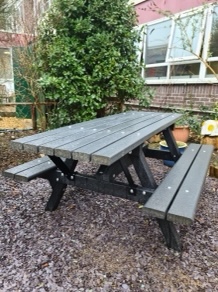New uses for UK’s 500,000 single-use used coffee cup waste

An innovative supply chain project, funded by the Welsh Government in partnership with WRAP Cymru, has taken many difficult to recycle items and successfully transformed these everyday products with existing end markets, including turning single use coffee cups into waterproof building materials and decking.
This unique two-year trial brought together several companies, including sustainability experts Nextek and the UK’s leading composite decking manufacturer Ecodek, who created a revolutionary new product in the world’s first composite decking made from ‘difficult to recycle’ coffee cups combined with metallised films, such as those used for crisp packets.
The radical trial is one of four projects that took common difficult to recycle waste items and reprocessed these into brand new products with an existing end market.
Ecodek’s new 100% recycled decking can turn 200 coffee cups into a square metre of new decking, which means the project has the potential to recycle a substantial part of the post-consumer single use plastic coffee cups that currently go to landfill, or incineration.
The composite material also incorporates metallised film waste from crisp packets and similar household packaging and is ideal for both exterior decking and hardwearing building applications. Making use of waste items in this way means the material is more sustainable and demonstrates that it can be made to perform as just as well as other, less sustainable options. Also, the resulting material has the potential to be used for several product applications, including decking and outdoor furniture and is structurally strong enough for a variety of building applications on a large scale.
Image
The potential to utilise post-consumer coffee cups is huge, with around 3.2 billion fibre-composite cups placed onto the UK market in 2019, and half a million single use coffee cups disposed of daily in the UK – only 0.25% of which are recycled (WRAP Fibre composite packaging report). Furthermore, to ensure the circularity of its new products, Ecodek offers a takeback scheme to ensure products are recycled into new items at the end of their life.
Claire Shrewsbury, Director of Insights & Innovation and Director for Wales WRAP, “These projects provide a unique offering which supports locally manufactured and remanufactured products made from recycled Welsh raw materials. They support the growth of local businesses, and help Welsh people get the maximum value from these products. Not only that but these incredible projects are all working to the same goal to help tackle climate change and creating a circular economy for these difficult to recycle materials. We hope to see more projects like these appearing throughout the UK”.
The recycled material was also used to build a picnic bench which has now been delivered to Coleg Cambria in Deeside, North Wales. The garden of the college where the bench will be located, is where young people are delivering a Welsh Government funded Local Places for nature project. The College has also recently launched NEBOSH (National Examination Board in Occupational Safety and Health) qualifications to meet demand for a new generation of ‘green’ leaders.
William Hogg, Managing Director at Ecodek, “Ecodek are delighted to have been part of this exciting project to develop a new closed loop recycling opportunity for these frequently used materials which has the potential to substantially reduce the amount of waste going to landfill”.
Nextek quote: Professor Edward Kosior, founder of Nextek “Our research into paper-plastic composites has led to the development of a unique compound that utilises the disposable cups’ potential as a valuable recycled material. This compound has the potential to be used for multiple applications, from waterproof decking and furniture to providing structurally strong materials on a much bigger scale and its durability, strength and versatility could easily match wood as a building material, in fact in many instances it would surpass it. This has the potential to transform the way we view waste as we learn to tap into and harvest our urban forest”.
The individual projects are working in collaboration with more than 20 partner organisations of different sizes, from both the private and public sectors. These four unique and innovative supply chain projects are aiming to change the way single use plastic is currently used and disposed of, by creating economically viable, sustainable and environmentally beneficial materials. Aligning with the UK Plastic Pact targets and assisting with the work into developing end markets for difficult to recycle materials.




